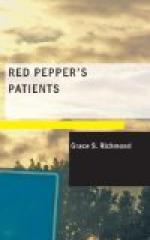On account of this latest interview he was able to bear up the better under the immediately following visit of his mother, an aristocratic-looking, sweet-faced but sad-eyed lady, who could not yet be reconciled to that which had happened to her son, and who visited him twice daily to bring hampers of fruit, food, and flowers, in quantity sufficient to sustain half the patients in a near-by ward. She invariably shed a few quiet tears over him which she tried vainly to conceal, addressed him in a mournful tone, and in spite of his efforts to cheer her managed to leave behind her after each visit an atmosphere of depression which it took him some time and strength to overcome.
“Poor mother, she can’t help it,” philosophized her son. “What stumps me, though, is why one who takes life so hard should outlive a man like my father, who was all that is brave and cheerful. Perhaps it took it out of him to be always playing the game boldly against her fears. But even so—give me the bluffers, like Red Pepper—and like Mrs. Red. Jove! but she’s a lovely woman. No wonder he adores her. So do I—with his leave. And so does Anne Linton, I should imagine. Poor little girl—what does she look like, I wonder?”
If he could have seen her at that moment, holding Susquehanna against her hollow young cheek, the glowing flower making the white face a pitiful contrast, he would have been even more touched than he could have imagined. Also—he would have felt that his wager concerning Susquehanna was likely to be lost. It is not conducive to the life of a rose to be loved and caressed as this one was being. But since it was the first of her flowers that Anne Linton had been able to take note of and enjoy, it might have been considered a life—and a wager—well lost.
CHAPTER VI
HEAVY LOCAL MAILS
Anne Linton lifted her head ever so little from the allowed incline of her pillow in the Good Samaritan Hospital. She peered anxiously at the tray being borne toward her by Selina Arden, most scrupulously conscientious of all trained nurses, and never more rigidly exact than when the early diet of patients in convalescence was concerned.
“Is that all?” murmured Anne in a tone of anguish.
“All!” replied Miss Arden firmly. But she smiled, showing her perfect white teeth—and showing also her sympathy by the tone in which she added: “Poor child!”
“Shall I never, never, never,” asked the patient, hungrily surveying the tray at close range, “have enough just to dull these pangs a little? Not enough to satisfy me, of course, but just enough to take the edge off?”
“Very soon now,” replied Miss Arden cheerily, “you shall have a pretty good-sized portion of beefsteak, juicy and tender, and you shall eat it all up—”
“And leave not a wrack behind,” moaned Anne Linton, closing her eyes. “But you are wrong, Miss Arden—I shall not eat it, I shall gulp it—the way a dog does. I always wondered why a dog has no manners about eating. I know now. He is so hungry his eyes eat it first, so his mouth has no chance. Well, I’m certainly thankful for the food on this tray. It’s awfully good—what there is of it.”




